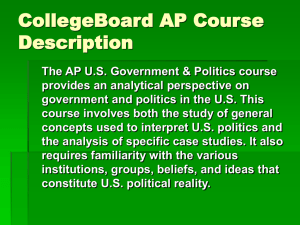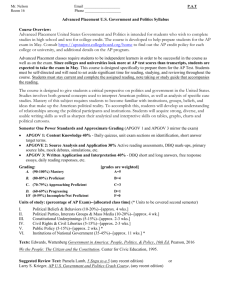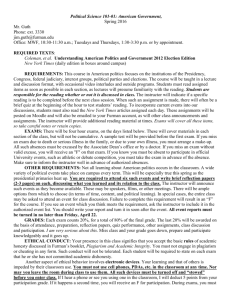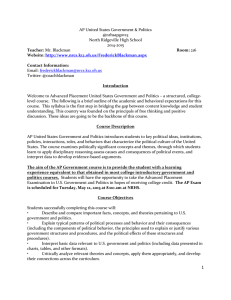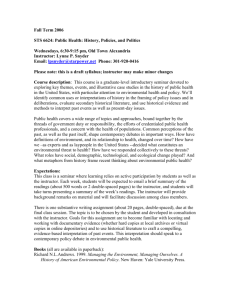Ms. Farrington - A.P. U.S. Gov't and Politics
advertisement
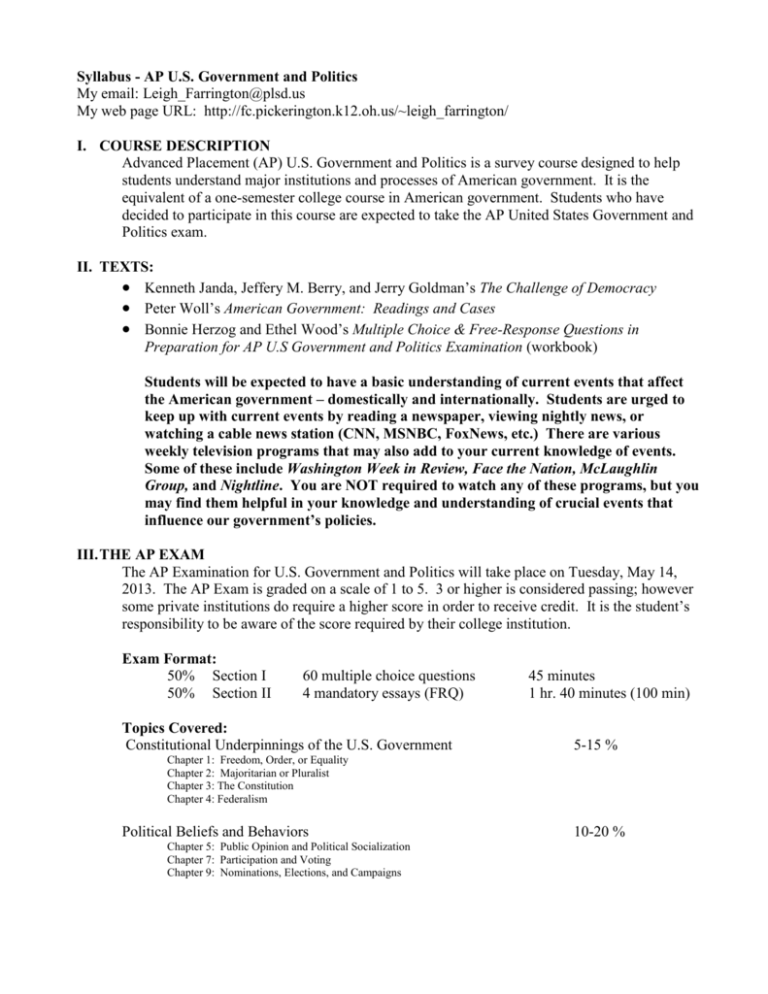
Syllabus - AP U.S. Government and Politics My email: Leigh_Farrington@plsd.us My web page URL: http://fc.pickerington.k12.oh.us/~leigh_farrington/ I. COURSE DESCRIPTION Advanced Placement (AP) U.S. Government and Politics is a survey course designed to help students understand major institutions and processes of American government. It is the equivalent of a one-semester college course in American government. Students who have decided to participate in this course are expected to take the AP United States Government and Politics exam. II. TEXTS: Kenneth Janda, Jeffery M. Berry, and Jerry Goldman’s The Challenge of Democracy Peter Woll’s American Government: Readings and Cases Bonnie Herzog and Ethel Wood’s Multiple Choice & Free-Response Questions in Preparation for AP U.S Government and Politics Examination (workbook) Students will be expected to have a basic understanding of current events that affect the American government – domestically and internationally. Students are urged to keep up with current events by reading a newspaper, viewing nightly news, or watching a cable news station (CNN, MSNBC, FoxNews, etc.) There are various weekly television programs that may also add to your current knowledge of events. Some of these include Washington Week in Review, Face the Nation, McLaughlin Group, and Nightline. You are NOT required to watch any of these programs, but you may find them helpful in your knowledge and understanding of crucial events that influence our government’s policies. III. THE AP EXAM The AP Examination for U.S. Government and Politics will take place on Tuesday, May 14, 2013. The AP Exam is graded on a scale of 1 to 5. 3 or higher is considered passing; however some private institutions do require a higher score in order to receive credit. It is the student’s responsibility to be aware of the score required by their college institution. Exam Format: 50% Section I 50% Section II 60 multiple choice questions 4 mandatory essays (FRQ) Topics Covered: Constitutional Underpinnings of the U.S. Government 45 minutes 1 hr. 40 minutes (100 min) 5-15 % Chapter 1: Freedom, Order, or Equality Chapter 2: Majoritarian or Pluralist Chapter 3: The Constitution Chapter 4: Federalism Political Beliefs and Behaviors Chapter 5: Public Opinion and Political Socialization Chapter 7: Participation and Voting Chapter 9: Nominations, Elections, and Campaigns 10-20 % Political Parties, Interest Groups, and Mass Media 10-20 % Chapter 6: The Media Chapter 8: Political Parties Chapter 10: Interest Groups Institutions of Nat’l Gov’t: Congress, Presidency, and Bureaucracy and Federal Courts Chapter 11: Chapter 12: Chapter 13: Chapter 14: 35-45 % Congress The Presidency The Bureaucracy The Courts Civil Rights and Civil Liberties 5-15 % Chapter 15: Order and Civil Liberties Chapter 16: Equality and Civil Rights Public Policy Chapter 17: Chapter 18: Chapter 19: Chapter 20: 5-15 % Policymaking Economic Policy Domestic Policy Global Policy * There are no state and local government questions on the AP Exam IV. MATERIALS SUGGGESTED / REQUIRED Large 3-ring notebook with dividers Writing utensil – pencil AND blue/black pen. Do not complete assignments in RED Textbook: The Challenge of Democracy Pocket Constitution V. GRADING POLICY The grading scale is denoted in the student handbook. The nine weeks grade will be determined by dividing the total points earned during the grading period by the total points possible. Grades will be earned on tests, quizzes, homework, in-class assignments, and class participation. This course is worth a weighted grade; however, the weighted grade is contingent upon your taking the AP Examination in May and receiving a C average or higher. Furthermore, if you take the AP Examination, you will not be required to take a final exam. A decision to NOT take the national exam will mean that you will still receive credit for the course but it will not be weighted. VI. CLASSROOM POLICIES AND PROCEDURES A. Make-Up Work: It is your responsibility to check the website for any missed work – AND to timely hand-in the assignment. If you have an excused absence, you will have the same number of days missed to make-up the work. Students who have an unexcused absence will receive a “0” for that day’s work. B. Homework: Since this is an AP course, I am sure that you realize that there will be extensive reading. The weekends and breaks will not necessarily be homework free. Since this is considered the equivalent of a college course, I will assign chapters for you to read and outline. You will be held responsible for the material – I will not spoon feed you, and thus will not be covering all of the material presented within the chapters. I expect you to read the chapters, take notes over the material, and ask questions during class. I will, however, review and add to the main concepts within the chapter and attempt to tie them in with current events. C. Snow Days: In the event of a snow day, an assignment may be posted on my web page. If there is an assignment, it will be posted by 10:00 a.m. on the morning of the snow day. It is your responsibility to check the web page after 10:00 a.m. (or to call a classmate if you do not have access to the internet). D. Extra Help: If you are experiencing difficulties with the coursework or any assignment, you are responsible for seeking individual assistance from me. I will inform you of my daily schedule and will also make myself available after school by appointment. VII. CLASSROOM RULES All school rules and policies denoted in the student handbook will be enforced in this class. Be on time! You must be in your assigned seat and ready to begin when the bell rings. Be prepared! Bring all necessary materials to class – daily. Be respectful! The classroom culture will be one based upon mutual respect. Politics is an arena of great public debate with people having a variety of opinions on issues – sometimes these issues can be quite controversial. It is imperative that we are able to listen and respond respectfully to views and opinions which may be in conflict with our own. In addition, there should be no profanity, explicit language or gestures, derogatory remarks or put-downs. This is the only way to ensure meaningful and productive classroom discussions. Unfortunately, I expect a higher level of civil discourse in my classroom than you will oftentimes find in society. Students will be dismissed by me – not the bell. Cheating is NOT acceptable and will result in a zero.


